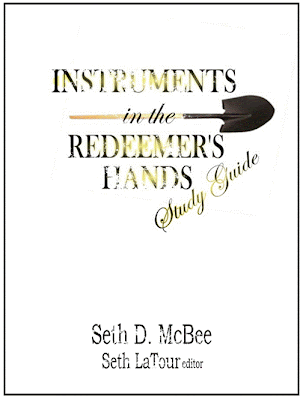It seems that some are objecting to my presentation on Hebrews 10, on the basis that "them that are sanctified" in Hebrews 10:14, "For by one offering he hath perfected for ever them that are sanctified," might (according to the objectors) refer to something less than the entire intended beneficiaries of the sacrifice. I went back and forth over whether a long or short argument should be presented, and the following is the short argument.
1. That it means all for whom the sacrifice was made, can be seen first from the parallel to verse 1.
In verse 1, it is written, Hebrews 10:1, "For the law having a shadow of good things to come, and not the very image of the things, can never with those sacrifices which they offered year by year continually make the comers thereunto perfect."
This verse provides the basis of comparison against which Christ's sacrifice is observed to be better. But it appears that προσερχομενους (the comers) is the entire group for whom sacrifices were offered. As you will recall, the person for whom the priest offers the sacrifice is the person who came to the priest and brought the victim to be sacrificed.
Consider, for example:
Leviticus 15:14-15
14And on the eighth day he shall take to him two turtledoves, or two young pigeons, and come before the LORD unto the door of the tabernacle of the congregation, and give them unto the priest: 15And the priest shall offer them, the one for a sin offering, and the other for a burnt offering; and the priest shall make an atonement for him before the LORD for his issue.
It is the comers to the animal sacrifices that were the group for whom the animal sacrifices were made, but they were not made perfect by those sacrifices. In contrast, those for whom the sacrifice of Christ is made are made perfect by that sacrifice. Furthermore, this perfection is already once for all accomplished. The elect will be (and have been) justified in time, but the judicial reconciliation was accomplished on the cross.
2. We also see it in the parallels to other passages:
A. Hebrews 5:7-9
7Who in the days of his flesh, when he had offered up prayers and supplications with strong crying and tears unto him that was able to save him from death, and was heard in that he feared; 8Though he were a Son, yet learned he obedience by the things which he suffered; 9And being made perfect, he became the author of eternal salvation unto all them that obey him;
Christ was made perfect as a priest so that he might perfect the intended beneficiaries of his sacrifice: namely those that obey him (aka the elect). This reemphasizes the point above that the single purpose of Christ's sacrificial work was to save the elect.
B. Hebrews 7:19
19For the law made nothing perfect, but the bringing in of a better hope did; by the which we draw nigh unto God.
It is here written that the law (that is, the animal sacrifice system) did not make anyone perfect, which is contrasted with the sacrifice of Christ, which did, and by which we can approach God. This reemphasizes that the difference between the old and new sacrifice is that the former did not make its intended beneficiaries perfect, whereas the new does.
C. Hebrews 9:7-12
7But into the second went the high priest alone once every year, not without blood, which he offered for himself, and for the errors of the people: 8The Holy Ghost this signifying, that the way into the holiest of all was not yet made manifest, while as the first tabernacle was yet standing: 9Which was a figure for the time then present, in which were offered both gifts and sacrifices, that could not make him that did the service perfect, as pertaining to the conscience; 10Which stood only in meats and drinks, and divers washings, and carnal ordinances, imposed on them until the time of reformation. 11But Christ being come an high priest of good things to come, by a greater and more perfect tabernacle, not made with hands, that is to say, not of this building; 12Neither by the blood of goats and calves, but by his own blood he entered in once into the holy place, having obtained eternal redemption for us.
Here again we see the glorious perfection of Christ compared and contrasted to the impotent animal sacrifices. Christ did not have to offer for his own sins, and when he came into the holy place he came with his own blood, having obtained eternal redemption for us. This reemphasizes the point above that the reconciliation is already bought - already paid for - and that the execution of that reconciliation is now a matter of justice as between Christ as advocate and the godhead. That is to say, Christ has obtained eternal redemption for the elect, and consequently the elect will not perish.
3. The opposite hypothesis (i.e. that "them which are sanctified" is a subgroup of the intended beneficiaries of the sacrifice) is without support in the text.
That is to say, the text gives no hint that there is some other group that is intended to benefit, but that is not perfected by the sacrifice. Furthermore, if such were the case, it would break down the parallel to the Old Testament above. For the old sacrifices contain no parallel to such a bifurcation in the intent of the sacrifice's benefits.
4. The warning passage in verses 26-29 cannot resuscitate a multiple intention view - instead, it fully undermines it.
Hebrews 10:26-29
26For if we sin wilfully after that we have received the knowledge of the truth, there remaineth no more sacrifice for sins, 27But a certain fearful looking for of judgment and fiery indignation, which shall devour the adversaries. 28He that despised Moses' law died without mercy under two or three witnesses: 29Of how much sorer punishment, suppose ye, shall he be thought worthy, who hath trodden under foot the Son of God, and hath counted the blood of the covenant, wherewith he was sanctified, an unholy thing, and hath done despite unto the Spirit of grace?
The reason it cannot help the multiple intention view is that in order to press this warning into service, they must state that Christ was sacrificed (vs. 26) for this hypothetical man who was judged, and that consequently he was "sanctified" (vs. 29). This, of course, reinforces the point above, that those for whom the sacrifice was made are equivalent to the sanctified group. The same word for "sanctified" is even used in both cases. Yet, we learn from verse 14 that Christ perfected them that are sanctified. Accordingly, we see that any objection from verses 26-29 just reinforces the original point.
That concludes the short form of the argument.
 I will be getting back to the debate within this week. I have been busy finishing up writing and putting together a study guide for our small groups study at our church based on the book, "Instruments in the Redeemer's Hands" by Paul David Tripp. I am now done and have it distributed to the church so my time is a little more free to get back into the debate. Sorry that it has been a while but this was more important and had a time constraint. I hope you all understand and we will resume shortly.
I will be getting back to the debate within this week. I have been busy finishing up writing and putting together a study guide for our small groups study at our church based on the book, "Instruments in the Redeemer's Hands" by Paul David Tripp. I am now done and have it distributed to the church so my time is a little more free to get back into the debate. Sorry that it has been a while but this was more important and had a time constraint. I hope you all understand and we will resume shortly.










